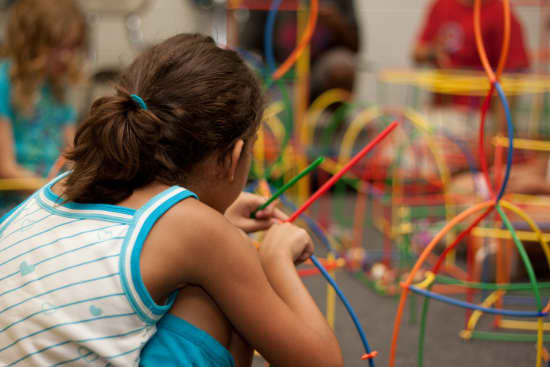Innovation in education
Prague is a place with a lot of young talented and above-average intelligent children. But it is important to support them and prepare good facilities for them. That is why we want to develop and innovate the education sector as much as possible.

The key is to use the potential in full
Although there are a large number of schools and gifted children in Prague, their potential is being used in an insufficient way and they and their parents alone are not enough to develop their talents. This means that they are gradually losing it. We would like to change this trend and to draw attention to the fact that Prague has talented children! So that the capital city can build upon their knowledge and skills in the future and show that they are the real excellence which can help create great things.
MiNDs are our future
They excel in terms of the depth of their knowledge and abilities, they are original and inquisitive. These are exceptionally gifted children and pupils, or MiNDs. But their level of giftedness can be highly erratic, they may hide it or they may stand against authorities. It is therefore possible to divide them into three categories.
Ideal MiNDs, who are studious types of children, mature socially and motivated to actively cooperate with teachers.
Hidden MiNDs, who may hide their talents due to fear of social exclusion or may be labelled as having a specific learning disability.
Rebellious MiNDs who are difficult to work with, have social problems, often resist authorities and are very difficult to motivate to work. These children are the most numerous.


The most important thing is support
Unfortunately, there is still a misconception that MiNDs do not need any support. But the opposite is true. This is based, among other things, on qualitative research conducted by the Prague Innovation Institute (PII) in 2021.
In fact, these pupils may stand out from the crowd, may be perceived as a disruptive element (giftedness may not be obvious at first sight and may be mistaken for a specific behavioural disorder). It is therefore important to ensure that they are supported as much as possible.
Specifically, in terms of integration into the team, the development of soft skills, ethical education, ensuring psycho-hygiene or support in the acceptance and further development of their own talents. These are the aspects we want to focus on and gradually integrate into our school system.
How do you work with gifted children?
Respondents to the survey agreed across all levels of education that they found the individual approach and the establishment of a personal relationship with a gifted child to be effective.
In terms of the content of teaching, virtually all of them prefer enrichment to acceleration. In kindergartens, for example, it is largely a matter of providing a stimulating environment with many sophisticated aids or using the NTC method (Mensa).
Concerning primary schools, it is most often about the methods that develop divergent thinking, approach the material in an “exploratory way” or focus more on understanding principles and strategies. These include, for example, Feurstein instrumental enrichment, Hejný method, the use of innovative teaching methods (cooperative, problem-based learning, Socratic questioning) and various logic games, such as Abaku, logiclike.com or gather.town.
At secondary schools, the opportunity to provide gifted children with opportunities to further develop their strengths (e.g., through cooperation with universities and research organisations) and to deepen their soft skills seems to be the most important aspect.


Where we can see room for improvement
In most cases, the respondents in primary schools had a programme of care for intellectually gifted pupils at the first level; unfortunately, when they leave for multi-year grammar schools, the classes usually empty out and it is no longer possible to continue special programmes for talent development.
Thus, gifted pupils with double exceptionality may remain at the second level, but their talents are then not given as much attention.
The common denominator of the range of problems also seems to be a certain rigidity. Whether in the area of education funding, teaching time, or even the content of education. Educators often resign themselves to trying to provide support for gifted pupils through official channels and they rather focus on an informal approach instead.
However, despite this, the authors of the research often encountered a very creative approach to teaching and strong efforts by developed by educators to establish a personal relationship with MiNDs. And we see this as the key to success.
Tomáš Lapáček, Innovation Manager for PragueNurturing talent and divergent thinking in children are essential factors to the city’s ability to respond to future challenges. And it is the role of the Prague Smart Accelerator (PSA) to pilot transformative projects with the tools to best develop this future excellence in human capital.
What we will do for you
Interconnection with the community
Do you want to become a part of the Prague innovation community? We can help you! We are experts in innovation development in Prague.
Read more detailsCorporate Support and Development
Do you have a business project which is just starting out? We help both established companies and start-ups.
Read more detailsBackground facilities in Prague
Are you planning to move to Prague and looking for local background facilities? We will help you to arrange for it in cooperation with the Expat Centre.
Read more details Praha Inovační
Praha Inovační 